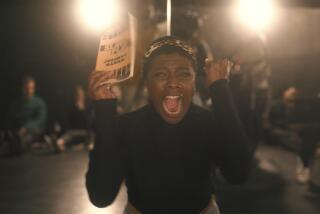‘East Texas Hot Links’ Seeks to Nourish Those That Integration Left Hungry
- Share via
Eugene Lee knows well the subject of racism in 1950s Texas.
“I grew up in Texas during that period,” said Lee, 38, whose new one-act “East Texas Hot Links” is at Hollywood’s MET Theatre. “Schools in Ft. Worth weren’t integrated until 1967. So I’m part of the ‘B.I.’--before integration--transition generation. I watched it all disappear . . . but not really. I saw the ‘Whites Only’ signs come down, but I can never forget they were there in the first place.”
Although the presence of racism blankets the play’s action, Lee’s characters--a motley assortment gathered at a diner--tell many stories, reveal many lives. Yet within their pathos and diversity, the playwright says, evolves a single metaphor: Food.
“I started with a word, restaurant , “ he said. “For a long time, that was the title of the play. The characters came out of that. I found that food was the common denominator; the story exemplifies the food chain. One character, Columbus, nourishes--everyone benefits from his kindness. Delmus is green, not quite ripe for the picking. Charlesetta is the maternal figure. Buckshot is a provider, a warrior, a hunter. XL is like a wild dog.”
If the offstage Klansmen are the overt representation of man’s inhumanity to man, the secretive and self-serving XL is the black Judas, selling out his own to curry white favor--and make a few bucks. “It’s a universal, familiar thing,” Lee said. “Every audience will identify with him. It’s like crabs in a barrel: As one of them reaches the top and is about to crawl out, it’s pulled back by the other crabs trying to get out. It’s a survival instinct of both man and animals.”
Director Ed De Shae believes the play, “without being agitprop,” sadly mirrors contemporary society. A member of UCLA’s theater department, De Shae cited the recent exposure of Inkatha leader Mangosuthu Gatsha Buthelezi’s financial ties to the South African government. “It’s taking money under the table--and I’m sure feeling justified--thinking, ‘This is good for me, and for us,’ but not looking at the larger picture, the ramifications.”
Lee sees the lessons closer to home. “It parallels what’s going on in the black community with gangs,” he said. “It’s very destructive. It kills itself, kills its culture, kills its family. It’s self-inflicted genocide.” Yet he shies away from indicting his characters, even XL. “They’ve found a means to be nourished, and often that nourishment is themselves. They’re eagles who’ve learned to soar in their cages--with dignity and pride.”
“East Texas” is Lee’s third play. He’s just finished a musical adaptation of Dickens’ “Oliver Twist” circa 1920s New Orleans; his first play, “Killingsworth,” is a murder mystery set in Tyler, Tex. “I’m looking at my own demons” by writing, Lee admitted.
A drama and political science graduate of Southwest Texas State University, Lee spent three years with New York’s Negro Ensemble Company --where he met director De Shae--and was in the original cast of the Pulitzer Prize-winning drama “A Soldier’s Play.” Off and on in Los Angeles since 1984, he’s appeared in film and TV roles, including as the son of Oprah Winfrey’s character in the miniseries “The Women of Brewster Place,” and currently teaches acting at Cal State Northridge.
Although he hopes his writing will live on after him, Lee has no aspirations to be the theatrical voice of the black community.
“In this play, I’ve tried to elevate dialect to poetry--as close as I can,” he explained. “I love language, and I’m a teacher. My grandmother said, ‘If you learn something, learn it so you can teach it.’ This play does have the lessons I’ve learned in life. But I don’t want to be the spokesperson for black people. That’s not just one voice. It’s Charles Fuller, Ray Arahna, August Wilson, Samm-Art Williams--and it’s all the truth. I can learn my part in the symphony, and play it well.”
More to Read
The biggest entertainment stories
Get our big stories about Hollywood, film, television, music, arts, culture and more right in your inbox as soon as they publish.
You may occasionally receive promotional content from the Los Angeles Times.










